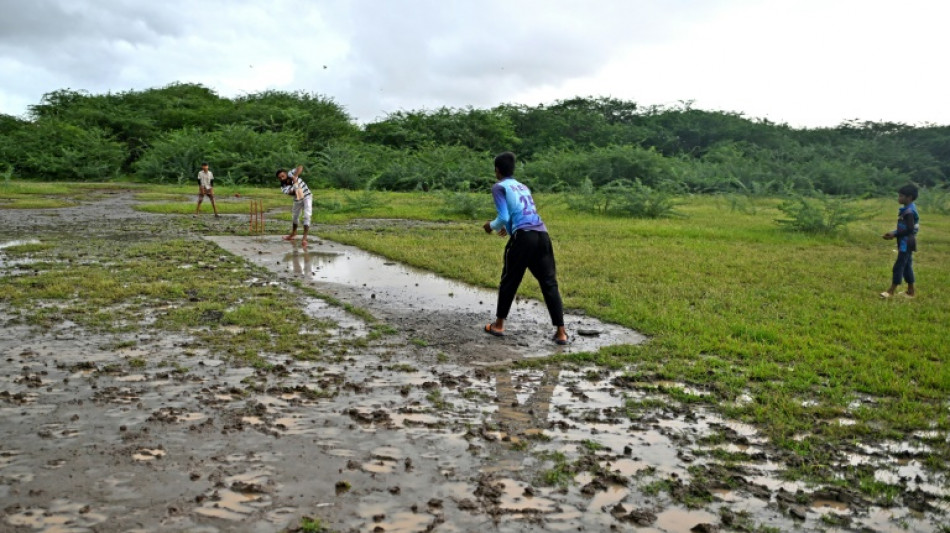
-
 9 killed in Canada mass shooting that targeted school, residence: police
9 killed in Canada mass shooting that targeted school, residence: police
-
De Zerbi leaves Marseille 'by mutual agreement'

-
 Netanyahu to push Trump on Iran missiles in White House talks
Netanyahu to push Trump on Iran missiles in White House talks
-
England captain Stokes has surgery after being hit in face by ball

-
 Rennie, Joseph lead running to become next All Blacks coach
Rennie, Joseph lead running to become next All Blacks coach
-
Asian stock markets mixed as traders weigh US data, await jobs

-
 Australian Olympic snowboarder airlifted to hospital with broken neck
Australian Olympic snowboarder airlifted to hospital with broken neck
-
Moderna says US refusing to review mRNA-based flu shot

-
 Instagram boss to testify at social media addiction trial
Instagram boss to testify at social media addiction trial
-
'Artists of steel': Japanese swords forge new fanbase

-
 New York model, carved in a basement, goes on display
New York model, carved in a basement, goes on display
-
Noisy humans harm birds and affect breeding success: study

-
 More American women holding multiple jobs as high costs sting
More American women holding multiple jobs as high costs sting
-
Charcoal or solar panels? A tale of two Cubas
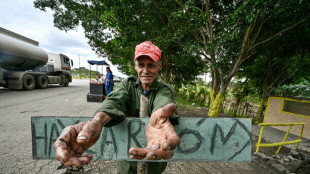
-
 Several wounded in clashes at Albania opposition rally
Several wounded in clashes at Albania opposition rally
-
Chelsea's draw with Leeds 'bitter pill' for Rosenior

-
 'On autopilot': US skate star Malinin nears more Olympic gold
'On autopilot': US skate star Malinin nears more Olympic gold
-
Carrick frustrated by Man Utd's lack of sharpness in West Ham draw

-
 Frank confident of keeping Spurs job despite Newcastle defeat
Frank confident of keeping Spurs job despite Newcastle defeat
-
James's All-NBA streak ends as Lakers rule superstar out of Spurs clash

-
 Anti-Khamenei slogans in Tehran on eve of revolution anniversary: social media footage
Anti-Khamenei slogans in Tehran on eve of revolution anniversary: social media footage
-
YouTube says it is not social media in landmark addiction trial

-
 Colombian senator kidnapped, president targeted in election run-up
Colombian senator kidnapped, president targeted in election run-up
-
Britney Spears sells rights to her music catalog: US media

-
 West Ham end Man Utd's winning run, Spurs sink to 16th
West Ham end Man Utd's winning run, Spurs sink to 16th
-
US skate star Malinin leads after short programme in Olympics
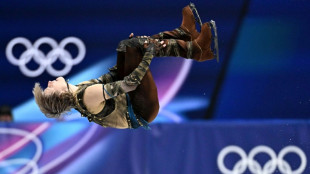
-
 Man Utd's Sesko strikes late to rescue West Ham draw
Man Utd's Sesko strikes late to rescue West Ham draw
-
Shiffrin flops at Winter Olympics as helmet row grows

-
 Celtics' Tatum practices with G League team but injury return uncertain
Celtics' Tatum practices with G League team but injury return uncertain
-
Gisele Pelicot publishes memoirs after rape trial ordeal

-
 Newcastle beat sorry Spurs to leave Frank on the brink
Newcastle beat sorry Spurs to leave Frank on the brink
-
'Outrage' as LGBTQ Pride flag removed from Stonewall monument

-
 Chappell Roan leaves agency headed by embattled 2028 Olympic chief
Chappell Roan leaves agency headed by embattled 2028 Olympic chief
-
Venezuelan authorities move Machado ally to house arrest

-
 YouTube rejects addiction claims in landmark social media trial
YouTube rejects addiction claims in landmark social media trial
-
Google turns to century-long debt to build AI

-
 'I felt guided by them': US skater Naumov remembers parents at Olympics
'I felt guided by them': US skater Naumov remembers parents at Olympics
-
Till death do us bark: Brazilian state lets pets be buried with owners

-
 Ukrainian athlete vows to wear banned helmet at Winter Olympics
Ukrainian athlete vows to wear banned helmet at Winter Olympics
-
'Confident' Pakistan ready for India blockbuster after USA win
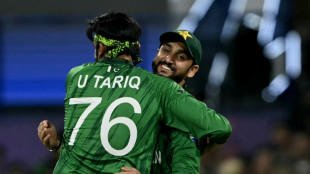
-
 Latam-GPT: a Latin American AI to combat US-centric bias
Latam-GPT: a Latin American AI to combat US-centric bias
-
Gauff dumped out of Qatar Open, Swiatek, Rybakina through

-
 Paris officers accused of beating black producer to stand trial in November
Paris officers accused of beating black producer to stand trial in November
-
Istanbul bars rock bands accused of 'satanism'

-
 Olympic bronze medal biathlete confesses affair on live TV
Olympic bronze medal biathlete confesses affair on live TV
-
US commerce chief admits Epstein Island lunch but denies closer ties

-
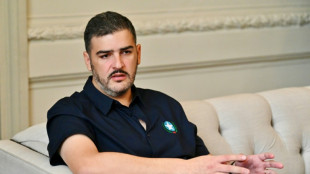 Mayor of Ecuador's biggest city arrested for money laundering
Mayor of Ecuador's biggest city arrested for money laundering
-
Farhan, spinners lead Pakistan to easy USA win in T20 World Cup
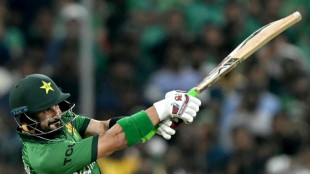
-
 Stocks mixed as muted US retail sales spur caution
Stocks mixed as muted US retail sales spur caution
-
Macron wants more EU joint borrowing: Could it happen?


Maiden match: three centuries of India's cricket obsession
Marooned mercenaries, gun-toting guards and sword-waving crowds; historians say the little-known tale of how cricket came to India three centuries ago shows how the game can bring people together.
When the Cricket World Cup opens on October 5 at a 130,000-seat mega-stadium in Ahmedabad, hundreds of millions of fans in the world's most populous country will unite in a national sporting obsession underpinning identity and pride.
Among those glued to the television will be residents of Tankari Bandar, a hard-scrabble fishing village some 120 kilometres (75 miles) to the south in Gujarat, which researchers say is the site of the first recorded game in India.
"I heard stories as a child from my father and grandfather that in 1721, a game of cricket was played by the Britishers near the river," said community leader Ranjit Sinh, 56.
"I'm proud that the first game of cricket was played in my village."
In the early 18th century -- a time of rival powers and rapacious European forces with pirates prowling the coast -- a ragtag bunch of foreign mercenaries and Indian marines sailed up the creek.
Among them was English sailor Clement Downing, who described how after becoming trapped by the tides, they rowed ashore and set up camp for two weeks underneath mango and tamarind trees.
- 'Flourishing their swords' -
The sailors were fearful. The last British sailor who stopped there had shot at villagers who "soon cut him to pieces and the few men he had with him", Downing wrote in his "History of the Indian Wars".
"We every day diverted ourselves with playing at Cricket and other Exercises," he added.
Soldiers guarded the boundary and sailors buying supplies went bristling with guns.
Villagers welcomed them by "flourishing their swords and making motions as if cutting off heads", he added.
But this time the strange foreigners thwacking balls seemingly defused tensions, and the visit passed off peacefully.
"Several times, four or five of the heads of the town came down on horseback with great attendance," Downing wrote, describing leaders flanked by bodyguards carrying bamboo lances and swords. "They would come and be spectators".
John Drew, a British academic, pinpointed the pitch location using ship records and historical charts.
"The sailors were expecting attack," he said. "What they got was people coming again and again to watch."
The 84-year-old believes there is a "very good chance" that Indians also took part.
There are claims by other locations -- including early 18th-century beach cricket by British soldiers in Kerala -- but Downing's account is the earliest recorded.
- 'Unites everyone' -
On the sweeping floodplains at Tankari, children with a homemade bat run on a pitch turned to mud by monsoon rains.
"Every day we play cricket," said Kaushik Ashok, 20, wearing his village team top. "We work, we fish, then we play cricket."
While few non-specialists know the story, some believe the account should be told more widely.
"In India, you have various sects, communities and languages, but this is one game that unites everyone," said theatre director P.S. Chari, 60, who is rehearsing a play about the match in the nearby city of Vadodara.
Of the sport's billion fans worldwide, more than 90 percent are in the Indian subcontinent, according to a 2018 International Cricket Council (ICC) study.
"Cricket has become so much a part of India, it's a national obsession," said art critic, cultural commentator, and Vadodara cricket association member Sandhya Gajjar, 66.
"That is why this story is important."
- 'Made it their own' -
In popular culture, the origin of Indian cricket is the story told in the 2001 Bollywood smash-hit "Lagaan", a fictional drama of villagers facing brutal British colonialists in a high-stakes match in 1893.
By then, England had codified rigid "Laws" of cricket.
But Chari notes the real game came when cricket was still played with makeshift balls and bats, meaning the "not so well refined" English sport melded easily with existing Indian games.
Those included pastimes still played today, including "gilly danda", where players use a stick to smack a smaller one, or "seven stones", where teams knock down towers of rocks.
"It was popular because it was similar to games already played," Chari said, praising India's "knack of adaptation" for cricket's rapid spread.
"They took this game of cricket and made it their own".
I.Matar--SF-PST


